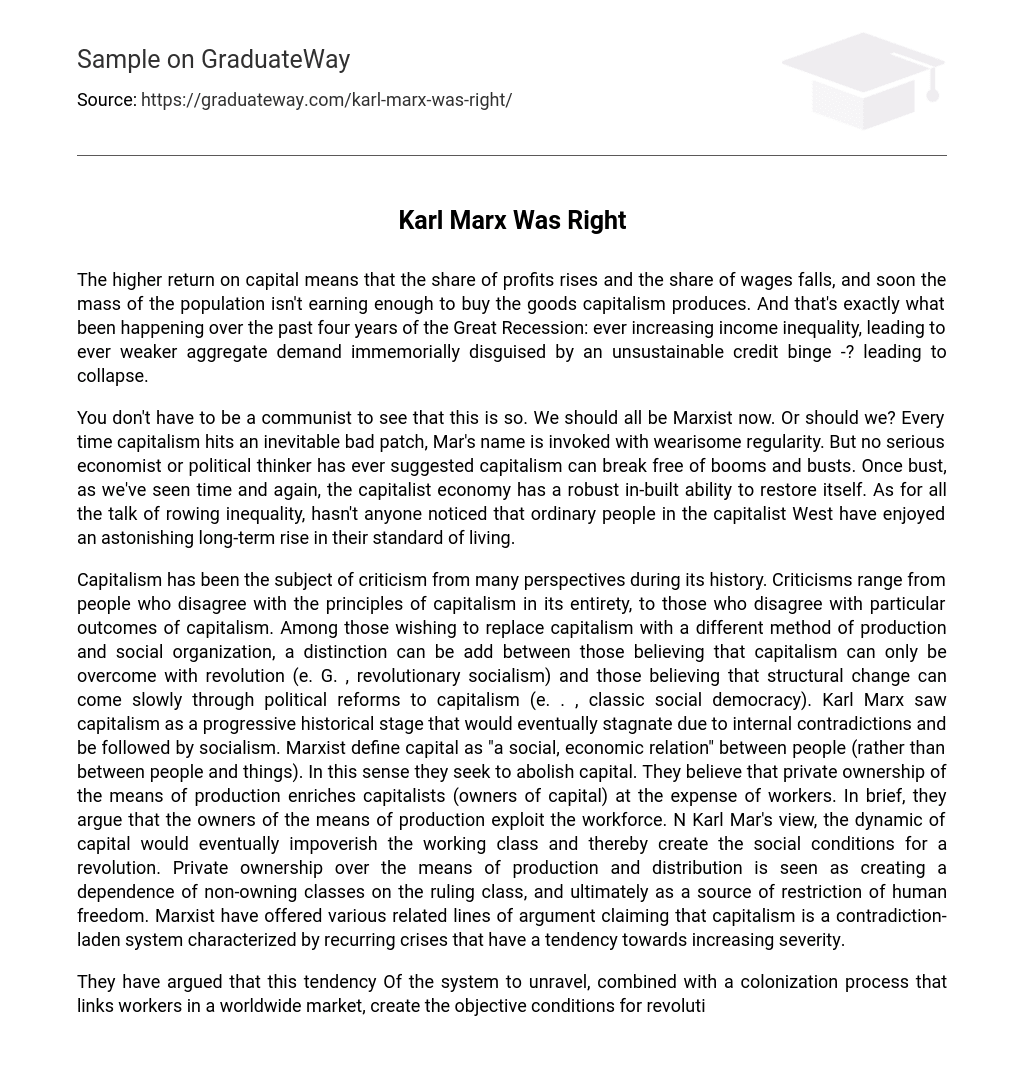The higher return on capital means that the share of profits rises and the share of wages falls, and soon the mass of the population isn’t earning enough to buy the goods capitalism produces. And that’s exactly what been happening over the past four years of the Great Recession: ever increasing income inequality, leading to ever weaker aggregate demand immemorially disguised by an unsustainable credit binge -? leading to collapse.
You don’t have to be a communist to see that this is so. We should all be Marxist now. Or should we? Every time capitalism hits an inevitable bad patch, Mar’s name is invoked with wearisome regularity. But no serious economist or political thinker has ever suggested capitalism can break free of booms and busts. Once bust, as we’ve seen time and again, the capitalist economy has a robust in-built ability to restore itself. As for all the talk of rowing inequality, hasn’t anyone noticed that ordinary people in the capitalist West have enjoyed an astonishing long-term rise in their standard of living.
Capitalism has been the subject of criticism from many perspectives during its history. Criticisms range from people who disagree with the principles of capitalism in its entirety, to those who disagree with particular outcomes of capitalism. Among those wishing to replace capitalism with a different method of production and social organization, a distinction can be add between those believing that capitalism can only be overcome with revolution (e. G. , revolutionary socialism) and those believing that structural change can come slowly through political reforms to capitalism (e. . , classic social democracy). Karl Marx saw capitalism as a progressive historical stage that would eventually stagnate due to internal contradictions and be followed by socialism. Marxist define capital as “a social, economic relation” between people (rather than between people and things). In this sense they seek to abolish capital. They believe that private ownership of the means of production enriches capitalists (owners of capital) at the expense of workers. In brief, they argue that the owners of the means of production exploit the workforce. N Karl Mar’s view, the dynamic of capital would eventually impoverish the working class and thereby create the social conditions for a revolution. Private ownership over the means of production and distribution is seen as creating a dependence of non-owning classes on the ruling class, and ultimately as a source of restriction of human freedom. Marxist have offered various related lines of argument claiming that capitalism is a contradiction-laden system characterized by recurring crises that have a tendency towards increasing severity.
They have argued that this tendency Of the system to unravel, combined with a colonization process that links workers in a worldwide market, create the objective conditions for revolutionary change. Capitalism is seen as just one stage in the evolution of the economic system. Normative Marxism advocates for a revolutionary overthrow of capitalism that would lead to socialism, before eventually transforming into communism after class antagonisms and the state cease to exist.
Marxism influenced social democratic and labor parties as well as some moderate democratic socialists, who seek change through existing democratic channels instead of revolution, and believe that capitalism should be regulated rather than abolished. Communism was the inevitable end to the process of evolution begun with feudalism and passing through capitalism and socialism. Marx wrote extensively about the economic causes f this process in Capital.
Volume one was published in 1 867 and the later two volumes, heavily edited by Engel’s, were published posthumously in 1885 and 1894. The labor theory of value, decreasing rates of profit, and increasing concentration of wealth are key components of Mar’s economic thought. His comprehensive treatment of capitalism stands in stark contrast, however, to his treatment of socialism and communism, which Marx handled only Us appreciably. He declined to speculate on how those two economic Systems would operate.





